In an attempt to reclaim the rights to her music, R&B legend Anita Baker announced last Tuesday that she is in a feud with her former record label, Warner Bros., to acquire the master licenses for her recordings. During such time she wants her fans to refrain from streaming her songs, she tweeted.
????Miraculously… i have out-lived *ALL, of my Artists Contracts???? They no longer "Own", My Name & Likeness. And, by Law…30 yr old, Mstrs are 2B Returned, 2 Me???? Unfortunately, They're gonna make me Fight 4 it. I'm Prepared, 2 do that. Please Dont advertise/buy them ABXO???????? pic.twitter.com/PXe9xzsJK0
— Anita Baker (@IAMANITABAKER) March 9, 2021
A master license gives the license holder the right to use a recorded piece of music in a media project such as a film, TV show or any other creation. The license is usually obtained from the person who owns the recording, which is the party that financed it, Republic World reported.
In Baker’s case, she has seemingly outlived her contracts and is now legally authorized to obtain music licensing to her records. She declared that she and the record label are ensuing in a legal war.
“They no longer ‘Own’ My Name & Likeness,” she tweeted. “And, by Law…30 yr old, Mstrs are 2B Returned, 2 Me.”
Baker is calling for fans to halt their streams and purchases of her music indefinitely.
“recordings Streamed & Sold are *Inferior & Missing Original Instrumentation,” she wrote on Twitter. “Recording Speeds have been "Sped Up" Bootleg/Bogus "Vinyls" R Not from Original Analog Mstrs. But, from Re-Processed (no Mid- Range frequencies) Digital Copies. Fans Deserve Better.”
recordings Streamed & Sold are *Inferior & Missing Original Instrumentation. Recording Speeds have been "Sped Up" Bootleg/Bogus "Vinyls" R Not from Original Analog Mstrs. But, from Re-Processed (no Mid- Range frequencies) Digital Copies. Fans Deserve Better???? pic.twitter.com/EaMNzZcgEw
— Anita Baker (@IAMANITABAKER) March 9, 2021
Baker’s ordeal comes after an enduring and complex history of artists struggling to maintain the rights to their music. Icon Collective breaks down the nature of copyrights and explains that they fall into two categories — master rights and publishing rights.
According to The Guardian, artists are typically expected to vindicate their music ownership privileges, in exchange for royalties, or compensation, due to promotion and distribution costs.
Other notable artists who have struggled to regain their music rights include Prince, who was engaged in a career-long conflict to claim his music masters, and Kanye West, who has described the music industry as “modern-day slave ships.”
I need to see everybody’s contracts at Universal and Sony
I’m not gonna watch my people be enslaved
I’m putting my life on the line for my people
The music industry and the NBA are modern day slave ships
I’m the new Moses
— ye (@kanyewest) September 15, 2020
“When you sign a music deal you sign away your rights. Without the masters you can’t do anything with your own music, West said, according to The Guardian. Someone else controls where it’s played and when it’s played. Artists have nothing accept [sic] the fame, touring and merch.”
In Prince's case, the “Purple Rain” singer even pulled his music catalog from Spotify, while continuing streaming services with Tidal, which guarantees higher dividends for artists.
Prince’s artist message on Spotify reads, "Prince's publisher has asked all streaming services to remove his catalog. We have cooperated with the request, and hope to bring his music back as soon as possible."
There are, however, music artists who have won the war in reclaiming their rights. According to Wonderwall, Dre. Dre reigned victorious following a legal battle with Death Row Records in 2015 after they withheld funds from the rapper.
"We are gratified that the federal court has unambiguously declared that Death Row has no right to engage in such tactics, and must hold all proceeds from these illicit distributions in trust for our client," Dr. Dre’s attorney, Howard King, said in a statement. "As a result, the rapper received 100% of the online profits."
It is not yet clear how long Baker's battle with her former label will endure or just when she'll be comfortable with her fans once again freely streaming her music. This is far from Baker's first legal dispute in regards to her music career. In 2001, she sued an audio equipment rental company alleging that they ruined her tracks. In 2006, Baker was sued by Kenneth"Babyface" Edmonds for not paying for his production services and canceling shows. In 2014, she was sued by her attorney for failing to pay her legal fees.
